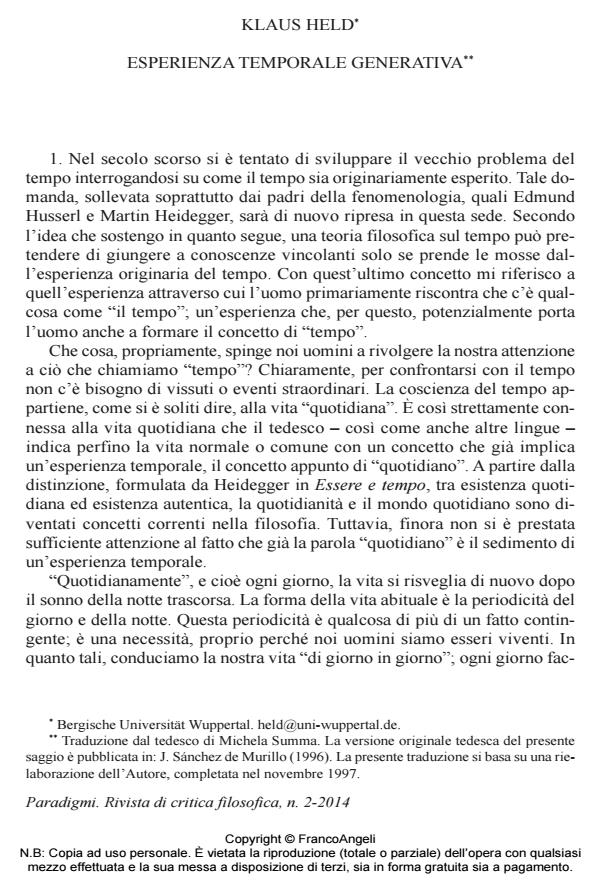Generative Temporal Experience
Journal title PARADIGMI
Author/s Klaus Held
Publishing Year 2014 Issue 2014/2 Language Italian
Pages 20 P. 11-30 File size 186 KB
DOI 10.3280/PARA2014-002002
DOI is like a bar code for intellectual property: to have more infomation
click here
Below, you can see the article first page
If you want to buy this article in PDF format, you can do it, following the instructions to buy download credits

FrancoAngeli is member of Publishers International Linking Association, Inc (PILA), a not-for-profit association which run the CrossRef service enabling links to and from online scholarly content.
This essay focuses on the generative experience of time. Together with the periodical rhythm of daily experience, generativity, bound to the periodical renewal of human generations, belongs to the original experience of time. After having discussed the analogies and the differences between the ephemeral, i.e. daily, and the generative experience of time, the author addresses the meaning of the generative experience of time in the communal life of the polis. Such an inquiry grounds the understanding of generativity as authentic experience of time, which is expressed in and through the love for another person, whose life has yet to begin. Giving birth, in this sense, is a choice for the freedom of a new beginning. The generative experience of time and the ethos that is grounded upon such an experience are finally considered in relation to the modern principle of subjectivity and its political relevance. How can democracy and the human rights, which are historically grounded upon the affirmation of the principle of subjectivity, be reconciled with the generative experience of time?
Keywords: Generative temporality, ephemeral temporality, authenticity, community, freedom.
- Arendt H. (1999). Vita Activa. Milano: Bompiani.
- Aristotele (1983). Etica nicomachea. Bari: Laterza.
- Aristotele (1990). La politica. Bari: Laterza.
- Aristotele (1973). Metafisica. Bari: Laterza.
- Gadamer H.-G. (1972). Über leere und erfüllte Zeit. In: Kleine Schriften III, Tübingen: Mohr/Siebeck: 137-153.
- Heidegger M. (2006). Essere e tempo. Milano: Mondadori.
- Heidegger M. (1991). Il principio di ragione. Milano: Adelphi.
- Hegel G.W.F. (2001). Fenomenologia dello spirito. Firenze: La Nuova Italia.
- Hegel G.W.F. (1999). Lineamenti di filosofia del diritto. Bari: Laterza 1999.
- Held K. (2013 – in stampa). Europa und die Welt. Studien zur weltbürgerlichen Phänomenologie. Sankt Augustin: Academia Verlag.
- Held K. (1998). Heidegger und das Prinzip der Phänomenologie. In: Gethmann-Siefert A., Pöggeler O., eds. Heidegger und die praktische Philosophie. Frankfurt a.M.: Suhrkamp: 182-198.
- Held K. (1991). Heimwelt, Fremdwelt, die eine Welt. Phänomenologische Forschungen, 24: 305-337.
- Held K. (1992). La fenomenologia heideggeriana delle tonalità emotive fondamentali. In: Bianco F., ed. Heidegger in discussione. Milano: Franco Angeli: 117-201.
- Held K. (1988). Per la riabilitazione della doxa. In: Berti E., ed. Tradizione e attualità della filosofia pratica. Genova: Marietti: 47-80.
- Held K. (1992). Zeit als Zahl. Das Pythagoräische im Zeitverständnis der Antike. In: Rohs P., ed. Zeiterfahrung und Personalität. Frankfurt a.M: Suhrkamp: 13-33.
- Marcel G. (1945). Homo viator. Prolégomènes à une métaphysique de l’espérance. Paris: Aubier.
- Platone (1989). Parmenide, Filebo, Simposio, Fedro. Bari: Laterza.
- Sánchez de Murillo J., ed. (1996). Edith-Stein-Jahrbuch: Das Weibliche. Würzburg: Echter.
- Tugendhat E. (1970). Der Wahrheitsbegriff bei Husserl und Heidegger. Berlin: De Gruyter. DOI: 10.1515/978311082689
Klaus Held, Esperienza temporale generativa in "PARADIGMI" 2/2014, pp 11-30, DOI: 10.3280/PARA2014-002002